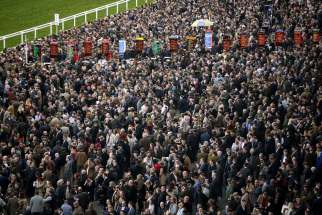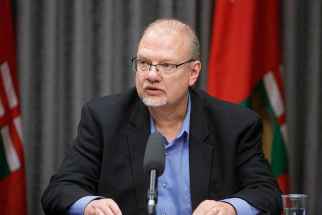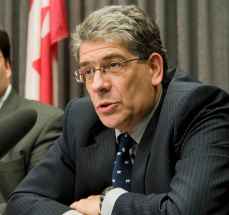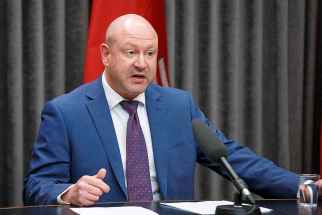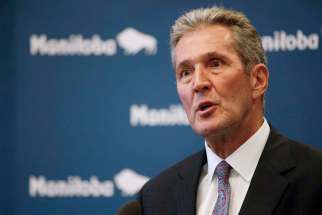Poisoning the podium Elite-level sports organizations hit with tsunami of abusive-coaching allegations from disillusioned, damaged athletes
Read this article for free:
or
Already have an account? Log in here »
To continue reading, please subscribe:
Monthly Digital Subscription
$0 for the first 4 weeks*
- Enjoy unlimited reading on winnipegfreepress.com
- Read the E-Edition, our digital replica newspaper
- Access News Break, our award-winning app
- Play interactive puzzles
*No charge for 4 weeks then price increases to the regular rate of $19.00 plus GST every four weeks. Offer available to new and qualified returning subscribers only. Cancel any time.
Monthly Digital Subscription
$4.75/week*
- Enjoy unlimited reading on winnipegfreepress.com
- Read the E-Edition, our digital replica newspaper
- Access News Break, our award-winning app
- Play interactive puzzles
*Billed as $19 plus GST every four weeks. Cancel any time.
To continue reading, please subscribe:
Add Free Press access to your Brandon Sun subscription for only an additional
$1 for the first 4 weeks*
*Your next subscription payment will increase by $1.00 and you will be charged $16.99 plus GST for four weeks. After four weeks, your payment will increase to $23.99 plus GST every four weeks.
Read unlimited articles for free today:
or
Already have an account? Log in here »
Hey there, time traveller!
This article was published 13/03/2020 (2104 days ago), so information in it may no longer be current.
Less than an hour before her final match at the 2006 Pan American senior wrestling championships in Rio de Janeiro, someone handed Leah Ferguson a cellphone.
The tournament had not gone well for Ferguson, a talented up-and-coming wrestler who was training at the University of Calgary. At just 19, this was her first senior tournament, representing a big step up in competition.
It was also being held in a partially open-air stadium that left the athletes exposed to Rio’s infamous heat and humidity. Given the harsh conditions and the level of competition, it was hardly a surprise that Ferguson struggled, getting pinned in her first three matches.
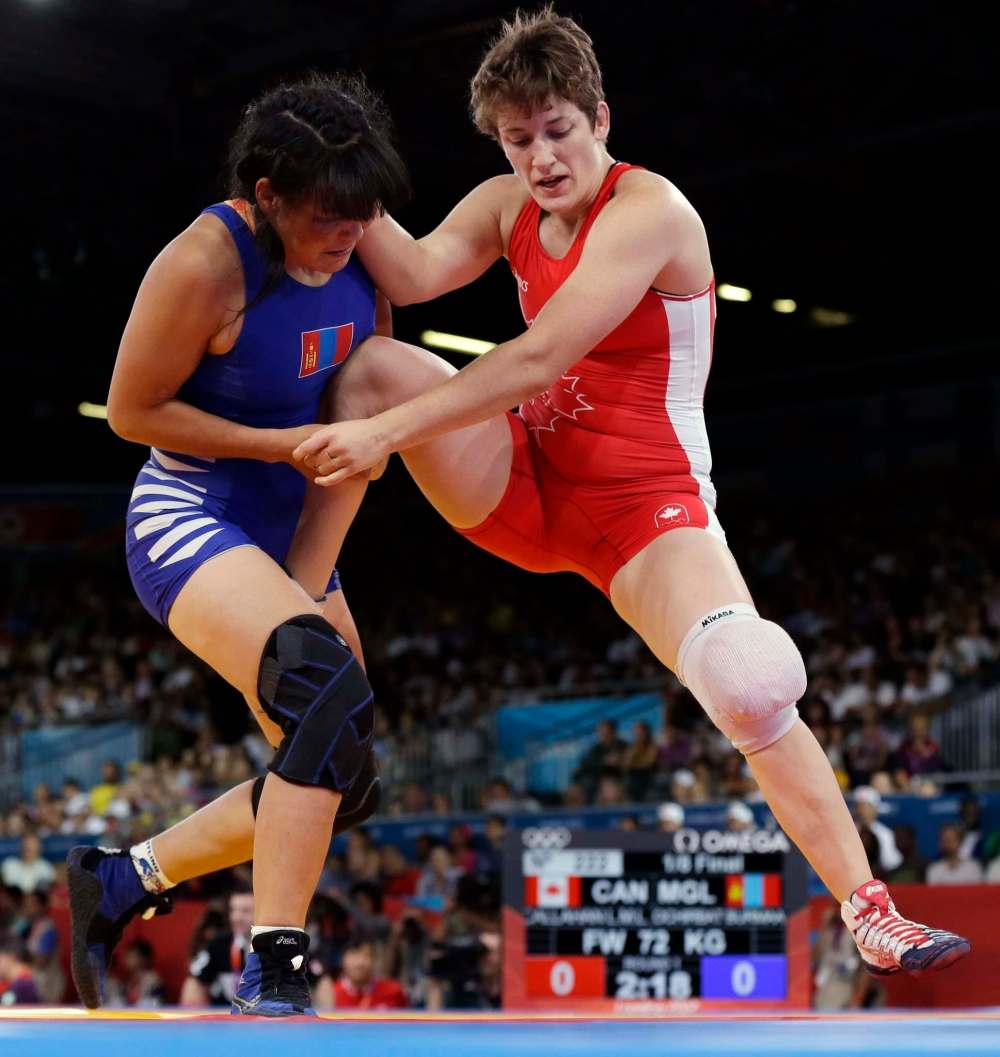
Ferguson grabbed the phone from one of the assistant coaches in the Rio stadium and heard Leigh Vierling, one of the national team’s top coaches who was also based in Calgary, on the line. Ferguson naively assumed he had called to offer some sort of pep talk.
“When I got on the phone, he really lit into me,” Ferguson says. “He told me that if I ‘lost another f–king match,’ if I ‘got f–king pinned again,’ I’d be ‘on my f–king back all summer long.’ He told me to not even show my face back home because he was going to make my life f–king miserable. He said he was going to make me feel that loss all summer long.”
Ferguson, stunned, handed back the phone. She knew profanity and personal attacks were commonplace in wrestling. Still, this was one of the first times she personally had been exposed to the full force of such a relentless tirade.
“I wasn’t sure I knew how to process what had just happened. I remember feeling, right there and then, that I was going to quit this sport,” she says.
Abuse at sports’ highest levels
A timeline of recent allegations suggests a pattern of abuse at elite levels of various sports organizations in Canada.
December 2018: Wrestling Canada releases a report by an independent investigator of multiple allegations of sexual abuse and generally abusive coaching behaviour. The report confirms that the national wrestling program has a “pattern” of verbal, psychological and physical abuse that had been accepted as normal within the culture of the sport.
January 2019: After stepping away from international competion, bobsleigh star Kaillie Humphries publicly reveals that she filed a complaint with Bobsleigh Canada Skeleton alleging mental and verbal abuse at the hands of national head coach Todd Hays. An internal investigation did not substantiate the allegations. This prompted Humprhies to file a lawsuit in September to force BCS to release her so she could compete for the United States. BCS complied later that month.
January 2019: Michelle Janus, head coach of the University of Lethbridge women’s hockey team, was fired after a group of players came forward the previous summer alleging numerous episodes of bullying and harassment. A formal complaint against Janus was filed under the school’s harassment policy. Unhappy with the internal process, four of the players filed a $1-million civil lawsuit against the university, Janus and the school’s sport and recreation executive director.
February 2019: Gymnastics Canada announces an internal investigation of sexual abuse allegations against former coach Dave Brubaker, who was acquitted of criminal charges involving a former athlete when she was 12. The case largely fell apart after it was learned the senior investigating officer was a close friend of the complainant. Brubaker had admitted to frequently kissing the young athlete on the lips.
March 2019: Five players at the University of Windsor women’s Lancers hockey team alleged verbal and psychological abuse at the hands of head coach Deanna Iwanicka. The players alleged they were subject to constant humiliation and expletive-laden rants from Iwanicka. An internal review concluded the allegations were unsubsantiated but the university has, to date, refused to release its findings.
April 2019: The Vancouver Whitecaps U20 women’s soccer program is rocked by allegations of abusive coaching when more than a dozen players came forward with specific complaints about a former coach that went back as many as 12 years.
April 2019: B.C. water polo coach Justin Mitchell was banned for life by Water Polo Canada for what was described as a “pattern of harassment, humiliating sexual remarks,” abusive behaviour and sexual advances involving a teenage athlete. The decision came after a two-year investigation revealed female athletes between the ages of 12 and 15 were subjected to constant negative comments about their bodies and performances.
July 2019: Three former members of Canada’s national alpine ski team reached an out-of-court settlement with Apline Canada over allegations of sexual abuse by former coach Bertrand Charest. Terms of the settlement were not disclosed. Charest was convicted in 2017 of more than three dozen sex-related criminal charges involving athletes between the ages of 12 and 18. He was sentenced to 12 years in prison but is currently free on bail while his appeal is heard.
November 2019: Three athletes and an assistant coach filed complaints against women’s rowing coach Barney Williams, alleging verbal abuse and harassment. After a six-month leave, Williams was reinstated when the complaints went to an internal adjudicator. The rowers who launched the original complaints were threated with legal action if they talked about the internal process. Rowing Canada announced it would conduct its own investigation of the complaints.
November 2019: Toronto Maple Leafs fire head coach Mike Babcock. Although the team did not initially describe the reasons for his termination, a few current and former players came out with stories alleging pyschologically abusive language and treatment of players. Two weeks after the firing, Leafs president Brendan Shanahan confirmed that Babock had used coaching tactics that were not “appropriate or acceptable.” Susequent stories included allegations by former Detroit Red Wings player Johan Franzen that Babcock verbally abused him on such a regular basis that he had a nervous breakdown.
November 2019: After an internal investigation, Calgary Flames head coach Bill Peters resigned after being accused by current and former players of physical abuse and racial slurs. In a statement released the next day, Peters admitted to using “offensive language” in a moment of frustration. Peters neither acknowledged nor apologized for allegations he had kicked former players during games.
December 2019: Chicago Blackhawks assistant coach Marc Crawford is put on indefinite leave following allegations he physically and verbally abused some of his players while coaching other teams. Crawford apologized, acknowledging that he used “unacceptable language and conduct toward players in hopes of motivating them.” Following an internal review by the Blackhawks, he was reinstated Jan. 2.
February 2020: Athletics Canada is still reeling after the Globe and Mail published allegations that former University of Guelph track coach Dave Scott-Thomas, who had also served as a top national coach, had engaged in a two-year sexual relationship with a 17-year-old female athlete under his care. Former athletes also accused him of creating a generally abusive and “toxic” culture while training.
— Dan Lett
“It was insane, I was surrounded by crazy people. Why would you call me from another country just to yell at me and call me names?”
Ferguson would, in fact, go on to win that final match by defeating a Brazilian wrestler in front of a rabid hometown crowd.
After her victory, Ferguson regrouped and, although still concerned about how Vierling had spoken to her, committed to continuing her career. That decision would expose her to an increasingly dangerous and abusive environment that eroded her emotional and physical well-being and her confidence as an elite athlete.
These are things that she has never publicly spoken about. However, following her retirement from competitive wrestling late last year and relocating to Winnipeg to coach youth wrestling, she has decided to speak out.
Looking back on it now, as she enters a new phase of her career as a coach, Ferguson says she has trouble understanding why she took so much abuse for such a long time.
“I never believed that any ounce of abuse was worth any ounce of success,” she says. “But that’s what we were forced to choose from. I’ve been through a lot of counselling to help me identify my patterns and my habits so that I can just move on to the next chapter without carrying that resentment and without becoming the leaders that I had. But that was a ton of work.
“By the time I realized what had happened to me, I was 30. I did a very good job the last seven months coming to terms with all that happened to me and I’m super-proud of myself. I knew that I was doing it to create a space in the sports system where a kid didn’t have to make that choice, where they didn’t have to choose between abuse and success as if they had to be together.”
● ● ●
You could hear a collective gasp from Canadians last fall when a handful of NHL hockey players broke ranks from their normally tight-knit community and alleged they had been abused at the hands of their coaches.
In a two-week flurry from late November to early December, two coaches would be fired, one was suspended and several others scrambled to defend themselves against allegations of kicking, punching and abusive language. The firings included Toronto Maple Leafs coach Mike Babcock who was, at the time, the highest-paid coach in the NHL.
The tales of coaching abuse in professional hockey made headlines around the world and kicked off a wide-ranging debate about just how far some coaches would go to find success. Many voices in the hockey world continued to argue that what some players called “abuse” was really just the price to be paid for a career in professional sports. Others countered that success in sports is no excuse for abusive behaviour. The NHL responded swiftly, introducing a new code of conduct and protocols for handling abuse allegations.
While the harsh glare of attention paid to the NHL coaching scandal may have provoked change in pro hockey, it obscured the fact that 2019 had been a watershed year for allegations of coaching abuse in other, lower-profile sports.
Between December 2018 and February 2020, abuse allegations tarnished four university sports programs: hockey at the universities of Lethbridge and Windsor; rowing at the University of Victoria; and track at the University of Guelph.
Add to that: one provincial sports organization (BC Waterpolo); one professional soccer club (the U20 women’s program of the Vancouver Whitecaps); and five national sports organizations (Wrestling Canada, Alpine Canada, Gymnastics Canada, Bobsleigh Canada Skeleton and Athletics Canada).
Ferguson says she could relate directly with the stories told by NHL players; the head games and verbal attacks, physical abuse masquerading as motivation and the punishment that accompanied failure of any kind.
She says her entire 12-year wrestling career at the University of Calgary and the Wrestling Canada Lutte national program was littered with repeated incidents of coaching abuse.
There was a 2014 match in which she was struck in the side of the head by her opponent and momentarily rendered dizzy. The blow was so hard she bit her tongue. Mouth full of blood, she regained her balance and went on to win the match, but only barely.
Afterward, her coach showed no concern about whether she was injured. Instead, he was furious that she nearly lost to an opponent he considered to be inferior. So, he demanded the rest of Ferguson’s team punch her in the side of head during all live wrestling practices. The tactic continued for more than a week.
“I remember my teammates being really upset and shocked at this and me thinking, ‘This is kind of insane, but I guess that’s what we’re doing,’” she says. “That’s what they do, they make it, I don’t know, really tough. It’s this culture of being tough that’s really prevalent in wrestling. Someone needs to hit you in the head and you don’t flinch. When you no longer flinch, practice is over.”
This coaching culture was largely accepted by the athletes because it was closely associated with advancement. Wrestlers on the national team were always competing with each other to get picked for tournament rosters and trips to other countries for competition. It was clear, Ferguson says, that you had to endure the abuse if you wanted to work your way up the team’s depth chart.
Abuse was also used to cull athletes who simply wouldn’t succumb to the culture.
Everyone on the national wrestling team knew that challenging a coach — either to protect themselves or another athlete — would lead to isolation. “If you object or resist, they ice you out,” she says. “They don’t speak to you anymore. They isolate you and ruin your reputation… to get you out of the program.”
At first, Ferguson says, she was willing to put up with the abuse as long as it helped her achieve her ultimate goal: competing in the 2012 London Olympics. She did, in fact, make the 2012 team (competing under her maiden name Callahan) and was an alternate at the 2016 Rio de Janeiro games.
“My entire coach-abuse situation revolved around making the Olympics, and it was pretty much a nightmare,” she says. “There were some awesome and surreal moments but overall, as I look back on it, it was pretty tragic.”
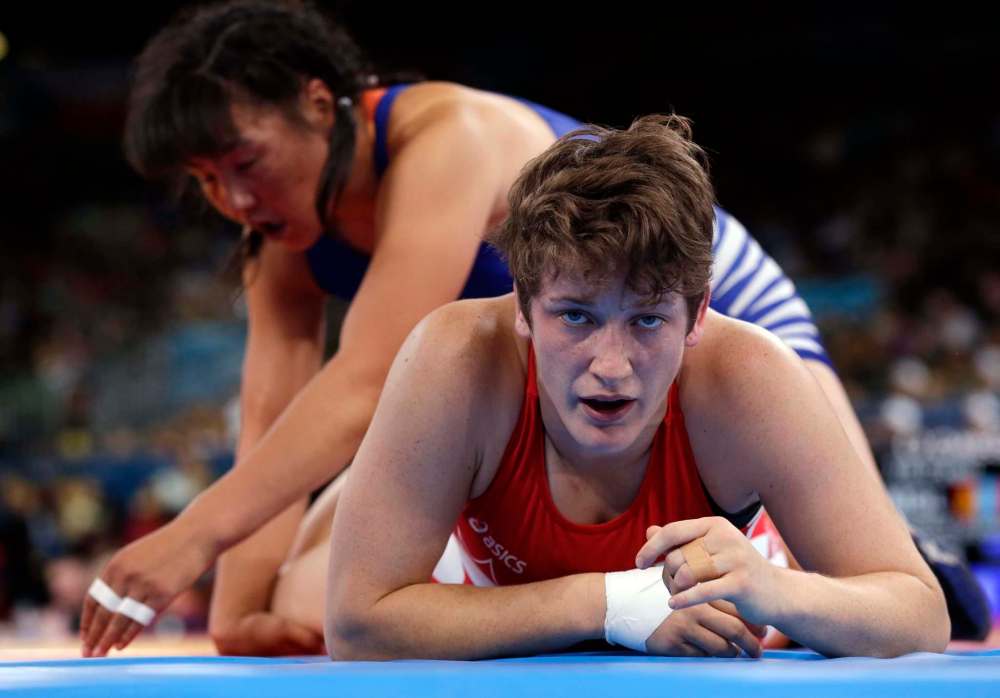
At the centre of the abuse was Leigh Vierling, the coach who berated her over the phone when she was a young athlete in Rio.
On one hand, Ferguson says, Vierling could be as angry and abusive as any of the coaches.
“If you got him really mad, he would lay into you like I had never been berated. He used a lot of profanity and he would personally attack your mind: ‘You are so f–king crazy and you could be so much better than this’ and, ‘What the f–k is wrong with you?’ and ‘This is so embarrassing.’”
But on the other, she says Vierling doted on his female athletes, demanding personal attention from them, both during training and on their own time. With a well-known penchant for dating female coaches and athletes, Vierling would constantly invite female wrestlers out for coffee or drinks, and would call at all hours of the day and night, she says.
Ferguson says she tolerated Vierling’s sexual harassment but did not encourage it. As a prominent national team coach, and then high-performance director, he had enormous influence over the wrestlers who were picked for prestigious tournaments and trips.
She eventually decided to stop resisting the harassment and “play the game,” she says, adding they did not have sex, but she consciously attempted to please him so that she wouldn’t be punished.
“It was just letting him hug me at practice, obvious and inappropriate touching, letting him call me and just be a part of my life in an emotionally vulnerable way because that’s what he needed,” she says.
“I did it not even out of fear, but just out of pure fatigue. I fought it for a long time, but then I realized that if you went for coffee with him or you told him you loved him and that kind of stuff, you would get the trips.”
The experience impaired her judgment and led her to make bad decisions about managing her career, she says.
Those choices included working with an extreme strength coach in a desperate bid to boost her performance; she suffered training injuries that affected her performance on the mat.
Eventually, she started to shed pounds so she could change weight classes and distance herself from Vierling.
For most of her career, Ferguson had wrestled between 72 and 75 kilograms (158-162 pounds). To avoid being coached directly by Vierling, she went down to the 69-kilo weight class (152 pounds). The process included excessive sweating regimes to drop more than six kilos of water weight and a radical calorie-reduced diet.
Those decisions took a lot of the joy out of her career and likely kept her from achieving better results, she believes.
“I wish I would have figured it out sooner,” she says. “I didn’t know how much it would hurt me.”
She finally decided to file a formal complaint against Vierling with Wrestling Canada Lutte in 2018. Even though he resigned his position the same year, an internal dispute-resolution process is ongoing; she says she is unable to comment on it.
Vierling declined to be interviewed. In a written statement provided to the Free Press, he would not answer any direct questions about allegations of abusive coaching, particularly the verbal abuse and sexual harassment Ferguson described. None of the allegations has been proven in court.
“I have worked incredibly hard to create a program that supported athletes in their goals and encouraged them to be their best and push their limits,” Vierling said in the statement.
“I was never autonomous in this program, but instead collaborated with coaches, sport scientists and sport medical practitioners to assist athlete development and help create personal-best athletic performances. Athletes earned their places on teams via rankings on the national level, and these criteria were set and shared with all the coaches. They earn these opportunities through their actions and not via selective decision-making….
“The allegations of my misconduct are not true and are defamatory in nature, and I will seek my remedy in court, if necessary.”
Training-room trauma
Anonymous comments from a 2019 survey of athletes shed light on abusive and traumatizing behaviour coaches routinely displayed.
“The high-performance director thinks that the tougher the coach is, the better we will become, so horrible conditions and abuse were not just tolerated but, in fact, glorified.”
● ● ●
“My coaches were mentally abusive and it’s gone unnoticed. I had an eating disorder and my teammates did, too. We were constantly put down and made to feel small and told that we could be kicked off the team and replaced in a heartbeat — it was best to suck it up and work hard. We were replaceable and if we weren’t under X pounds we were considered fat, and a nobody.”
● ● ●
“I had a coach that would post body-fat percentage amounts. I’ve definitely had an eating issue for the last 20 years.”
● ● ●
“My teammate was pressured by our national coach to lose weight, when weight has nothing to do with the sport. He would stare at her while she ate at team dinners and make fun of her. No one could say anything because he had the right to kick you off the team if he didn’t like you. Also, some coaches would drink with their female athletes and ask them inappropriate questions… again, couldn’t complain or you would be out of favour with them… you get used to this system pretty quickly, or you don’t make it far.”
● ● ●
“There is still a culture of excusing inappropriate coach behaviour by labelling them as ‘passionate.’ Former athletes go on to marry their coaches, with whom they had experienced imbalanced power and under-aged sexual relationships. Abusive foreign coaches are excused of their behaviour toward children because they ‘produce.’ Clubs turn a blind eye / excuse bullying of young LGBT athletes by their peers as ‘kids being kids.’ Parents are brainwashed into thinking that only the toughest coaches will turn their children into champions, and support them blindly.”
● ● ●
“I have seen systemic sexual abuse of female athletes by male coaches at every level of sport starting at the grassroots. Nothing was ever done. I have seen abuse of women under 18 years of age with a large age gap between the coach and athlete. Other coaches knew about abuse and did nothing. Turning a blind eye was the norm. Everyone feared consequences of confronting the issues.”
● ● ●
“I just feel the swearing and being frustrated with the athletes is oftentimes normalized. It may be a testament of the culture fostered in this sport, however, it still isn’t fun to be on the receiving end of it.”
● ● ●
“With my coach, boys especially get harassed, humiliated, threatened, bullied on a regular basis. I am routinely told I am obese, f–king useless, I have no talent, my (skill) is dog s–t, I eat wrong, we walk too loud; I could go on forever…. Every day during team activity, I am told I can be replaced, I will be sent home, I am off the team if I don’t “X,” there is a plane ticket waiting for me…. I am not allowed to eat much, because I am constantly being told I am fat. I was hungry all the time while travelling this past season; my food was controlled so that I would lose weight. I get treated like this and I am the top male athlete on the team.”
● ● ●
“Knowing we can be replaced and our careers are on the line, you are regularly forced to ignore issues or maltreatment out of fear. I have witnessed blackmail, intimidation, favouritism, experienced verbal and mental abuse personally. We are silenced or put down if (you) ask questions. I am fearful that after I speak out, I will be punished.”
● ● ●
“Power and funding rules over athletes, and there is nowhere for them to go otherwise that doesn’t spit them back into the (National Sport Organization) pocket. Like it, deal with it or (you’re) out, that’s what we are told.”
● ● ●
“The fear of being blacklisted / kicked off a team / losing funding kept me silent when I should have spoken up and done something when I witnessed cases of bullying / harassment.”
● ● ●
“I left because I was the favourite target of an abusive coach. I was so afraid of him and “what he would do to me” if my mom found out what he had done — I usually felt sick. Could not really concentrate. I left this sport because of fear.”
— Anonymous comments from 2019 AthletesCAN survey
— Dan Lett
Allegations of sexual harassment and abusive behaviour are notoriously difficult to substantiate. In many of the coaching-abuse stories that broke in 2019, allegations were often dismissed as isolated incidents involving particularly frail athletes who are not up to the rigours of elite-level sports.
Ferguson’s allegations may have easily fallen into that category if not for a parallel investigation at WCL that coincided with her allegations against Vierling.
Independent from Ferguson’s sexual harassment complaint, WCL had begun an independent investigation of a broader array of abusive-coaching concerns. The organization hired Ottawa lawyer David Bennett to probe wrestling’s coaching culture.
In his final report, delivered in December 2018, Bennett found a “pattern” of physical, psychological and verbal abuse in a culture that had adopted a “one size fits all” approach to coaching.
Bennett heard about coaches hitting, grabbing and pushing athletes in fits of anger or frustration with their performances. This often included extreme training exercises designed to prompt severe exhaustion or vomiting. In one-on-one training sessions, coaches were “overly aggressive with the athlete, to the point of hurting the athlete.” This process involved “smashing athletes’ faces off of the mat, pushing athletes up against the wall, punching and hitting athletes.”
Bennett said some of the athletes he interviewed were so afraid of their coaches, they did not want to return to their corners during matches for fear of abuse. He heard of coaches who would tell athletes they “wrestled like s–t” and that their performances were “embarrassing.” Other times they would call the athletes “fat,” “lazy,” “slut” and “useless.” One wrestler recounted receiving a text message from a coach following a loss that said, “You f–king suck.”
The abusive practices were part of a strategy where “athletes are being broken down physically, emotionally and psychologically and then being built back up stronger,” Bennett wrote. “This is meant to build an athlete’s confidence.”
While not all of the athletes Bennett talked to were affected by this approach to coaching, he was concerned “that athletes are being broken down and being left broken without having been built back up.”
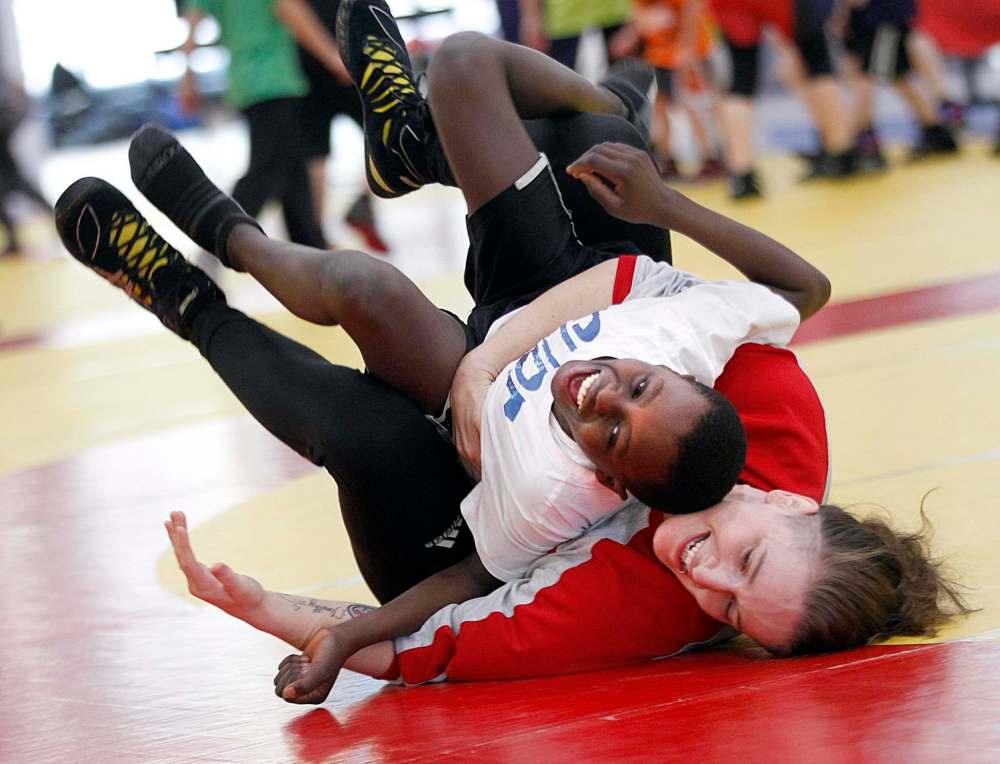
It is clear reading the Bennett report that the concerns go well beyond any one coach. Still, Vierling would figure prominently in the final report.
Bennett noted that in 2015, a complaint was lodged against “the former high performance director” over a sexual relationship he was having with an athlete.
Ferguson confirmed that this was a thinly veiled reference to Vierling, who dated both coaches and athletes during his time with the national wrestling program. Bennett reported that despite the complaint against Vierling — and an almost universal belief that coaches should not be allowed to have sex with athletes in a high-performance environment — he was allowed to return to his position. Bennett found the handling of this complaint had significantly eroded trust in WCL.
“It cannot be overstated how the handling of the former high performance director’s sexual relationship with an athlete and WCL’s response hurt WCL’s reputation,” the report stated.
“Athletes and coaches alike… almost universally do not like the idea of sexual relationships between coaches and athletes. In an email, a national centre coach characterized WCL as creating a ‘culture of consequence-free sexual misconduct.’”
Vierling declined to comment on the Bennett report and its findings in his statement to the Free Press.
Ferguson says that after avoiding any punishment for the 2015 complaint, Vierling continued to subject her to personal attacks and abuse, alternating with inappropriate and unwanted attention. On at least two instances — including one immediately after she suffered a serious elbow dislocation — Vierling made clear sexual advances, she says.
“For two years, I feel I was consciously a part of the harassment. It was probably the most psychologically damaging years of my life,” she says. “I just made choices against my own value system and against my own health.”
● ● ●
For Wrestling Canada Lutte, the Bennett report was a mixed blessing.
It represents detailed and painful evidence that the organization allowed some of its coaches to treat athletes with a complete lack of respect and compassion.
WCL executive director Tamara Medwidsky says her organization accepted the findings in the Bennett report and has already published a followup report that shows progress on all of the recommendations he made.
But Medwidsky, a former high-performance wrestler, says she never saw or personally heard about any of the abuse detailed by Bennett.
“We are not suggesting that the information is not true,” she says. “We’ve acknowledged that the information that came through the report was alarming and we’re making changes going forward.”
At the same time, the Bennett report represents the first time a national sports organization not only conducted a truly independent investigation of abuse allegations but also publicly released full and unabridged findings. As such, WCL is a positive outlier, and the report is a landmark examination of a problem that exists across all elite-level sports.
“I think that report, to the extent of my knowledge, is almost unprecedented,” says Dasha Peregoudova, a lawyer with Toronto firm Aird & Berlis and the president of AthletesCAN, a national organization that promotes athlete safety.
“Even though it doesn’t excuse or forgive any of the errors made, we should still recognize the positive steps taken: a proper investigation, public disclosure and admission of wrongdoing, both past and present.”
The WCL investigation is unique, largely because so few national sport organizations are willing to deal with their coaching-abuse problems in an open and transparent way. The allegations are often kept in house and investigations, when they do occur, are tilted in favour of the organiations at the expense of the athlete, Peregoudova says.
“There has been a culture of self-regulation in sports that is rife with conflict of interest. So, when these stories arise, we have what appear to be all these isolated examples when, in fact, this is part of a bigger problem,” she says.
● ● ●
Because of those concerns, and in an attempt to demonstrate the magnitude of the problem, AthletesCAN conducted an in-depth survey of coaching abuse. Working closely with the federal government’s Safe Sport Working Group and academics from the University of Toronto, the survey documented the experiences of 764 current and 237 former athletes.
The survey’s findings were stunning.
Two-thirds of current and three-quarters of former athletes were victims of deliberate neglect, 59 per cent of current and 62 per cent of former athletes experienced emotional (psychological) harm and 12 per cent of current and 19 per cent of former athletes reported being exposed to physical harm. The survey also revealed that 19 per cent of current and 21 per cent of former athletes surveyed had experienced some form of sexual harm.
It confirmed that athletes exposed to the harmful behaviours suffered mental-health issues.
The survey found that 16 per cent of current and 22 per cent of retired athletes suffered from eating disorders, nine per cent of current and 11 per cent of retired athletes practised self-harm, such as cutting and burning, 13 per cent of current and 20 per cent of retired athletes had thought about suicide and 35 per cent of current and 33 per cent of retired athletes sought help for mental-health challenges.
The survey was critically important for two reasons: it confirmed abusive coaching was not an exception for elite-level athletes; and that physical and psychological abuse was more prevalent and affected more athletes than sexual abuse.
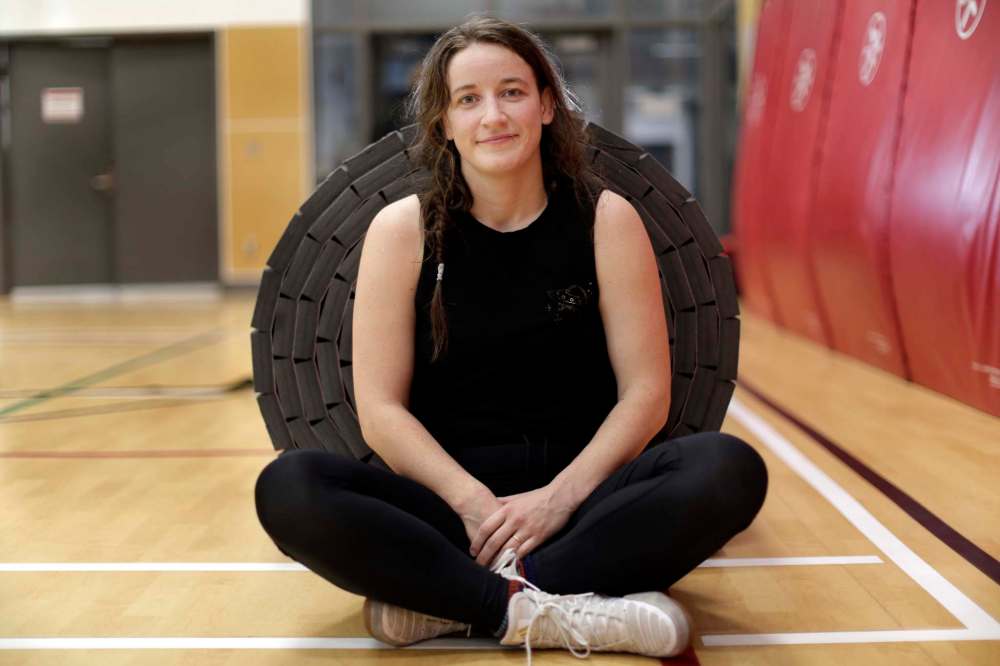
Allison Forsyth, a former Olympic alpine skier who revealed in 2018 that she was sexually abused by one of her coaches, said the survey confirmed something athletes and their advocates had believed for a long time: the shock of sexual misconduct was diverting attention away from other devastating forms of coaching abuse.
Forsyth, who last year launched a lawsuit against Alpine Canada for failing to protect young athletes from one particular coach, said despite their high profile, incidents of serial sexual abuse in sports are quite rare while physical and psychological abuse are rampant in some sports.
“I was a victim of sexual abuse and I would never underplay how extremely traumatic that was for me and my teammates,” says Forsyth, a member of the AthletesCAN board of directors.
“But what we have to focus on at least with equal attention are things like sexual harassment, physical abuse, emotional abuse, neglect and verbal harassment. All of those other behaviours that lead to traumatic effects on athletes and don’t get the airtime or the same level of publicity or understanding.”
Forsyth says she continues to coach young athletes and believes that to help them reach their full potential, there must be accountability. That will require coaches to be very direct and, at times, intense. However, there is growing awareness around the fact that there must be “appropriate boundaries” around coaching tactics to ensure that “we don’t cross over into dangerous territory.”
Behaviours such as harassment, favouritism and neglect are definitely over the line, she adds.
“What we’re looking for is a change in the entire culture of sport,” she says.
● ● ●
On a wrestling mat on the second floor of the University of Winnipeg’s gleaming downtown fieldhouse, Ferguson is about to square off with a 10-year-old boy less than half her size. She has been pressed into service because an odd number of wrestlers showed up for her early morning training program.
For those who have never seen high-level amateur wrestling live, it’s not for the faint of heart: the action is frantic and the sheer violence can be, at times, a bit unnerving.
And yet, there are times when it is more like a dance than the choreographed street-fighting that we see in professional wrestling. Each move a wrestler makes is really a series of two or three moves designed to put an opponent off-balance. Push, pull, grasp, spin — wrestling is a whirlwind marriage of strength and strategy.
As they face off on the mat, a smile spreads across the mouth of the younger wrestler as he circles Ferguson. He is nervous, but clearly eager to test himself against a former Olympian. Suddenly, he attacks her like a spider monkey, lunging, spinning and grappling with incredible speed and intensity. After a series of furious moves that leave Ferguson pinned, she taps out.
Larger and stronger, she could easily overpower the boy. Instead, she provides just enough resistance to make him work hard. It’s a delicate balance that allows him to work on his technical skills and develop confidence.
“I’m going to make sure they have a different experience than I had,” she says, still sweating from her workout.
All successful elite athletes need healthy doses of confidence in order to succeed, so it makes sense for high-performance coaches to steer clear of any behaviour that could erode it.
“It’s easy to be all positive when you’re in a youth-sports setting,” says University of Manitoba sports psychologist Adrienne Leslie-Toogood, who also serves as the chair of the Canadian Sport Psychology Association.
“It’s a lot more difficult in a high-performance setting.”
Safe sports principles are often sacrificed in high-performance sports on the altar of success, Leslie-Toogood says.
There are a lot of collateral issues driving that sacrifice and ramping up the pressure to succeed. Performances are directly connected to funding for the individual athletes and their national sport organizations. The athletes know that careers are short, and they must be willing to make sacrifices in order to earn their places on the biggest stages against the world’s best.
However, current research in sport performance and psychology clearly shows that abuse does not function as an effective motivator for high-level athletes, she says; some athletes may respond to the challenge, but the majority never reach their full potential when they are harassed and abused.
“I get frustrated when I hear that you have to abuse an athlete to achieve excellence,” she says. “The science is clear: you can coach high-level sport in a safe and non-abusive way. You can demand excellence and accountability from an athlete in a positive and safe environment. Let’s face it, if you want people to do their best, we know that they have to be well. That means emotionally and physically well.”
Ferguson says she will concentrate on becoming the coach that she wishes she had when she was wrestling at an elite level. She says she’ll never shake the feeling that the culture she experienced limited what she could have achieved.
“I look back now and what I realize was that I was good,” she says. “I feel now like I lost my soul. I feel like I always consciously knew this was wrong and all the stories they were telling me about how this behaviour would lead to success were also wrong.
“We never achieved the success they said was going to come.”
dan.lett@freepress.mb.ca

Born and raised in and around Toronto, Dan Lett came to Winnipeg in 1986, less than a year out of journalism school with a lifelong dream to be a newspaper reporter.
Our newsroom depends on a growing audience of readers to power our journalism. If you are not a paid reader, please consider becoming a subscriber.
Our newsroom depends on its audience of readers to power our journalism. Thank you for your support.

